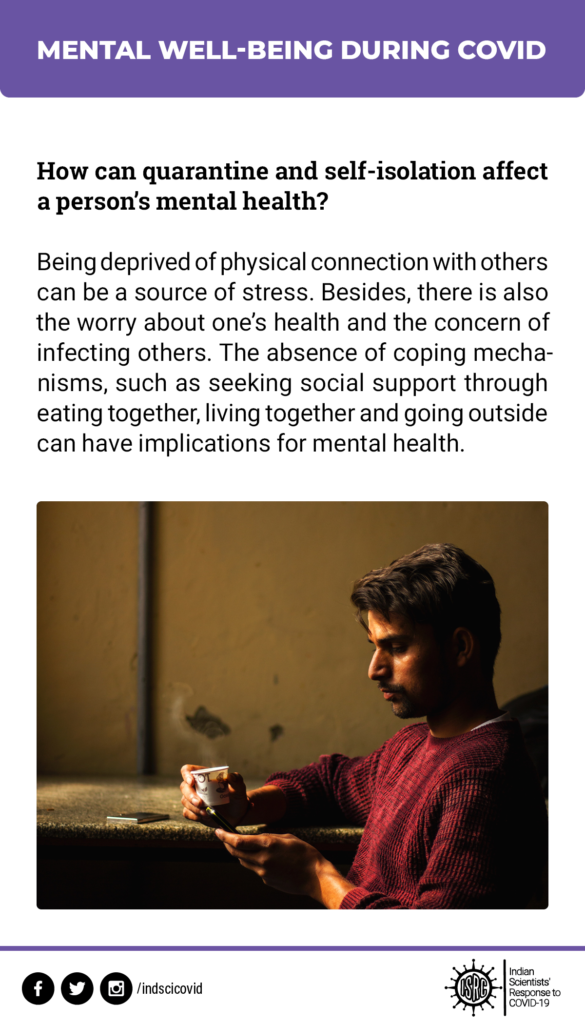Mental Health of People in Isolation
The Covid-19 pandemic can have significant effects on mental health. There have been several efforts to examine the psychological experiences of patients undergoing quarantine/self-isolation over the years, not only in the context of COVID-19. Some mental health concerns found to be prevalent among such people are depressed mood, emotional disturbances, increased levels of stress, irritability, insomnia, post-traumatic stress symptoms, anger and emotional exhaustion. Here we list the importance of mental health at this time, some warning signs indicative of mental health concerns, and strategies to help, aimed specifically at People in Isolation.
Access our webinar on mental health with Prof Sanjeev Jain.
We provide infographics in several languages as well as more details. Click on images to open and download them!
How can quarantine and self-isolation affect a person’s mental health?

There have been several efforts to examine the psychological experiences of patients undergoing quarantine/self-isolation over the years, not only in the context of COVID-19. Some mental health concerns found to be prevalent among such people are depressed mood, emotional disturbances, increased levels of stress, irritability, insomnia, post-traumatic stress symptoms, anger and emotional exhaustion. Low mood and irritability especially stand out as common concerns. Others include frustration due to uncertainty and lack of information about health and recovery, and the possibility of infecting others. Additional information can be found here – https://www.thelancet.com/journals/lancet/article/PIIS0140-6736(20)30460-8/fulltext
What can one do to help oneself during isolation or quarantine?

The typical duration of quarantine for COVID-19 is 14 days, assuming that the person tests negative for the virus at the end of quarantine. The uncertainty associated with the test results can contribute to higher levels of stress experienced by the person. A lack of information on the rationale for quarantine can add to this uncertainty and cause one to feel a lack of control over the situation. Another factor to consider here is that quarantine conditions can also be for people who are not showing symptoms of COVID-19, but are at risk for being infected. The worry about the possibility of carrying the infection can be another source of stress. Changes in one’s usual routine, coupled with a lack of activity, can contribute to anger, resentment and frustration in the person. Individuals in isolation/quarantine are likely to experience boredom, which can lead to feelings of emptiness and helplessness. It is also important to consider the person’s limited access to resources that normally help the person cope with adversity. In hospital settings, one’s access to a variety of food, internet connectivity, entertainment devices, books and clothes might limit self-care. Additional information can be found here – https://www.ncbi.nlm.nih.gov/pmc/articles/PMC7176378/
What are some sources of stress to consider during quarantine / self-isolation?

Worry and concern can be unpleasant, but are understandable experiences at this time. It is important to attend to what one can do in terms of self-care. Focussing on the present, and on actions that one can control might help. Find ways to stay connected with others. Establish a daily routine and limit the consumption of news regarding COVID-19. Try to incorporate some physical movement through yoga, exercises, stretching and squats, which can be done at home. Fight boredom through resources available at home or trying out your hobbies. Ultimately, being compassionate to oneself and finding ways to both offer and receive help from others can help managing loneliness as a result of being in quarantine/isolation. Additional information can be found at https://www.npr.org/2020/04/12/832682496/coronavirus-quarantines-what-it-means-to-face-trauma-in-a-household-of-one https://www.sahealth.sa.gov.au/wps/wcm/connect/public+content/sa+health+internet/conditions/infectious+diseases/covid+2019/community/self-isolation+and+quarantine+advice+for+covid-19+%28coronavirus%29 https://welldoing.org/article/benefits-being-inside-experience-quarantine https://www.cnbc.com/2020/03/20/coronavirus-tips-for-protecting-your-mental-health-during-quarantine.html https://www.powerofpositivity.com/stay-positive-mental-health-tips-quarantine/ https://indianexpress.com/article/coronavirus/coronavirus-covid-19-kerala-health-apparatus-mental-heath6323689/ https://www.newindianexpress.com/states/andhra-pradesh/2020/apr/02/tele-counselling-for-mental-health-of-quarantined-people-2124703.html https://healthtrends.com/mental-health-under-quarantine/